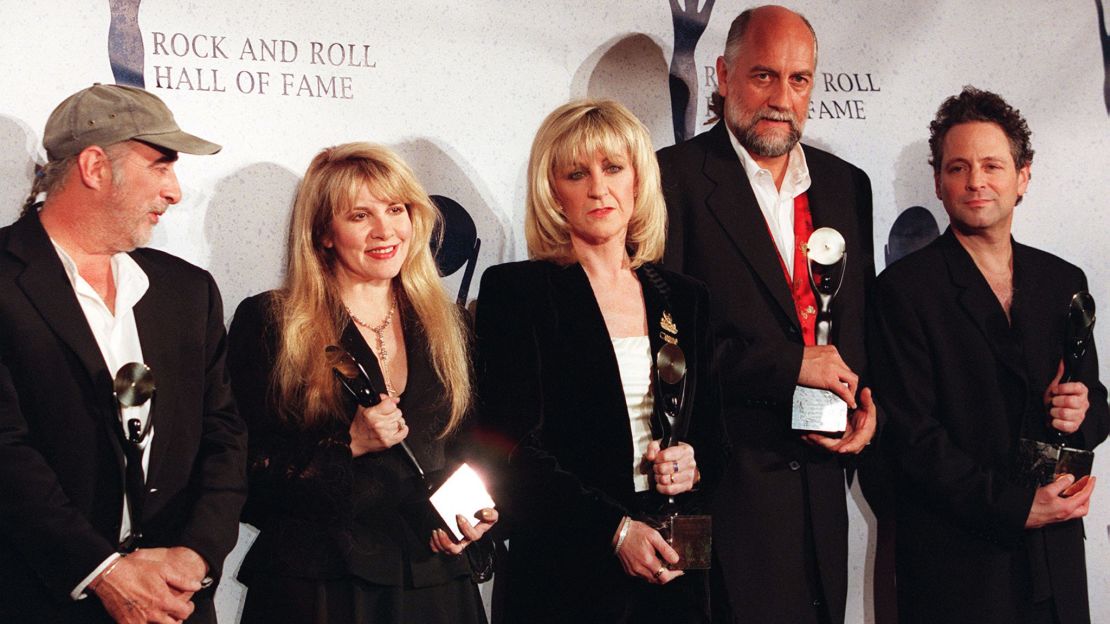
CNN
—
Throughout the various personal turmoils for which the members of Fleetwood Mac are known, one relationship buoyed the band for decades: the friendship between its two frontwomen, Christine McVie and Stevie Nicks.
McVie joined the band in 1970 during one of its early lineup changes and for years was its only woman. When Nicks was added to the lineup in 1975, the two became fast friends.
Theirs was not a competitive relationship, but a sisterly one – both women were gifted songwriters responsible for crafting many of the band’s best-known tunes. Though the two grew apart in the 1980s amid Nicks’ worsening drug addiction and the band’s growing internal tension, they came back together when McVie returned to Fleetwood Mac in 2014.
At a concert in London, shortly before McVie officially rejoined the band, Nicks dedicated the song “Landslide” to her “mentor. Big sister. Best friend.” And at the show’s end, McVie was there, accompanying her bandmates for “Don’t Stop.”
“I never want her to ever go out of my life again, and that has nothing to do with music and everything to do with her and I as friends,” Nicks told the Minneapolis Star-Tribune in 2015.
On Wednesday, McVie, the band’s “songbird,” died after a brief illness at age 79. Below, revisit McVie’s and Nicks’ years-long relationship as bandmates, best friends and “sisters.”
McVie and Nicks hit it off from the start
The story of Nicks joining Fleetwood Mac is legend now: Band founder and drummer Mick Fleetwood wanted to recruit guitarist Lindsey Buckingham, who stipulated that he would only join if his girlfriend and musician Nicks could join, too. McVie cast the deciding vote, and the rest is history.
“It was critical that I got on with her because I’d never played with another girl,” McVie told the Guardian in 2013. “But I liked her instantly. She was funny and nice but also there was no competition. We were completely different on the stage to each other and we wrote differently too.”
Throughout the band’s many personal complications – McVie married and divorced Fleetwood Mac bassist John McVie and had an affair with the band’s lighting director, while Nicks had rollercoaster romances with Buckingham and Fleetwood – they were each other’s center.
“To be in a band with another girl who was this amazing musician – (McVie) kind of instantly became my best friend,” Nicks told the New Yorker earlier this year. “Christine was a whole other ballgame. She liked hanging out with the guys. She was just more comfortable with men than I had ever been.”
The two protected each other, Nicks said, in a male-dominated industry: “We made a pact, in the very beginning, that we would never be treated with disrespect by all the male musicians in the community.
“I would say to her, ‘Together, we are a serious force of nature, and it will give us the strength to maneuver the waters that are ahead of us,’” Nicks told the New Yorker.
The band succeeds but McVie and Nicks grow distant
“Rumours” was the band’s greatest success to date when it was released in 1977. But the band’s relationships with each other were deteriorating, save for the one between McVie and Nicks. While the pair were enduring breakups with their significant others, Nicks and McVie spent their time offstage together.
The Guardian asked McVie if she was trying to offset the band’s tumult with her songs on “Rumours,” including the lighthearted “You Make Lovin’ Fun” and optimistic “Don’t Stop.” She said she likely had been.
As multiple members’ drug use intensified, the band’s dynamic grew tense. McVie distanced herself from the group in 1984 amid her bandmates’ addictions, telling the Guardian she was “just sick of it.” Nicks, meanwhile, was becoming dependent on cocaine.

McVie told Rolling Stone that year that she’d grown apart from Nicks: “She seems to have developed her own fantasy world, somehow, which I’m not part of. We don’t socialize much.”
In 1986, Nicks checked into the Betty Ford Center to treat her addiction, though she later became addicted to Klonopin, which she said claimed years of her life. She quit the prescription drug in the 1990s.
After recording some solo works, McVie returned to Fleetwood Mac for their 1987 album “Tango in the Night,” and two of her songs on that record – “Little Lies” and “Everywhere” – became major hits. But Nicks departed the band soon after, and the band’s best-known lineup wouldn’t officially reunite until 1997 for “The Dance” tour and subsequent live album.
The reunion was short-lived: After the band was inducted into the Rock & Roll Hall of Fame in 1998, McVie officially quit Fleetwood Mac, citing a fear of flying and exhaustion of life on the road.
McVie returns to Fleetwood Mac – and to Nicks’ side
In the 2010s, after more than a decade of retirement, McVie toyed with returning to performing. She officially rejoined Fleetwood Mac after calling Fleetwood himself and gauging what her return would mean for the group.
“Fortunately Stevie was dying for me to come back, as were the rest of the band,” she told the Arts Desk.
In 2015, a year after she’d rejoined Fleetwood Mac, McVie hit the road with her bandmates. Touring with the group was tiring but fun, the first time they’d performed together in years.
“I’m only here for Stevie,” she told the New Yorker that year.

Nicks concurred: “When we went on the road, I realized what an amazing friend she’d been of mine that I had lost and didn’t realize the whole consequences of it till now,” she told the Minneapolis Star-Tribune in 2015.
During that tour, McVie wore a silver chain that Nicks had given her – a “metaphor,” McVie told the New Yorker, “that the chain of the band will never be broken. Not by me, anyways. Not again by me.”
McVie told the Arts Desk in 2016 that she and Nicks were “better friends now than (they) were 16 years ago.”
Touring with Buckingham and Fleetwood could quickly get tumultuous for Nicks, McVie said, due to their shared history. “But with me in there, it gave Stevie the chance to get her breath back and not have this constant thing going on with Lindsey: her sister was back,” she said.
Their mutual praise continued: In 2019, McVie said Nicks was “just unbelievable” onstage: “The more I see her perform on stage the better I think she is. She holds the fort.”
When their 2018-2019 tour ended, though – without Buckingham, who was fired – the band “kind of broke up,” McVie told Rolling Stone earlier this year. She added that she didn’t speak with Nicks as often as she did when they toured together.
As for a reunion, McVie told Rolling Stone that while it wasn’t off the table, she wasn’t feeling “physically up for it.”
“I’m getting a bit long in the teeth here,” she said. “I’m quite happy being at home. I don’t know if I ever want to tour again. It’s bloody hard work.”
News of McVie’s death rattled Nicks, who wrote that she had only found out McVie was sick days earlier. She called McVie her “best friend in the whole world since the first day of 1975.”
On her social media accounts, Nicks shared a handwritten note containing lyrics from the Haim song “Hallelujah,” some of which discusses grief and the loss of a best friend.
“See you on the other side, my love,” Nicks wrote. “Don’t forget me – Always, Stevie.”





